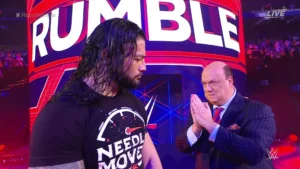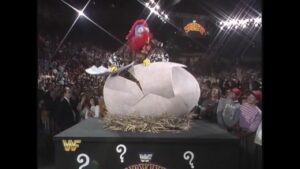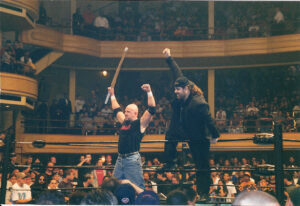*The Undertaker technically made it five straight decades at the recent Saudi Super Showdown. However, given that this was more of a glorified cameo appearance, it won’t be counted in this article.
Professional wrestlers tend to have a short shelf life. Given the nature of the job, it is common knowledge that professional wrestling careers tend not to last. Endless travelling and bumping hundreds of times a year means wrestlers fortunate enough to have prolonged careers are usually suffering by the end of them. Take Mick Foley, for example. Foley debuted in 1983 and by the time of his first retirement in 2000, he was barely able to walk. Even today, Foley is still plagued with the limp which largely contributed to the end of his career. Kurt Angle is another example; he has recently gone on record as saying his “quality of life sucks”. Like Foley, the pain Angle feels daily serves as a constant reminder of his years on the road and in the ring.

Notably, there are exceptions. Chris Jericho is one example of someone fortunate enough to still be wrestling today, despite a career spanning decades. Y2J made his debut in the fall of 1990 – yet still works today. He sits pretty at the top of the All Elite Wrestling card. He is constantly involved in discussions of the coveted title of the “greatest of all time”. If he had debuted a year earlier, this article would be in celebration of both Chris Jericho and The Undertaker.

However, as The Undertaker began his pro wrestling career in 1987 and is all set to make it five straight decades of The Deadman at WrestleMania 36 – when he takes on “The Phenomenal” AJ Styles, this series will be dedicated to the career of Mark Calaway. The article will be broken down into five parts, to celebrate each of the five decades The Undertaker has “dug holes and taken souls” in. This first part will cover Taker’s early years – the 1980s – and will largely focus on his debut and short stint in World Championship Wrestling (WCW). So sit back and relax as we take a stroll through memory lane… or memory graveyard. Because he’s “The Deadman”.

The Undertaker was born Mark Calaway on March 24th, 1965. Born in Houston, Texas, Mark would grow to be a staggering 6″10. He would grow to become a relatively established center for the Rams. Calaway’s sheer presence and ability with a basketball meant he would receive an offer to play in Europe. A teammate of Calaway’s, Victor Spencer, notably described him as “a hell of a power player”. Calaway’s natural size combined with his athleticism would make him a viable contender for a potential pro-wrestling career. Therefore, Calaway then had to make the choice between carrying on his basketball career, or switching to pro-wrestling.

Thankfully, he opted for a career in professional wrestling. In 1987, at just 22 years of age, Calaway – as Texas Red – made his debut for World Class Championship Wrestling. Though he lost his debut match to the legendary Bruiser Brody, it was in WCCW where Calaway would begin making a name for himself. Undertaker recently appeared on the Stone Cold Podcast on the WWE Network. When revealing he was brave enough to go toe-to-toe with Brody, Austin declared “you got some balls”, to which Taker replied “I ain’t got no brains”.

Brody was a notorious tough guy within the business, so this acts as a demonstration of the kind of qualities Taker possesses as one of the most notorious locker room leaders of all time (more on that later). He would form a friendship with Will Moody – the future Paul Bearer. Moody would manage Texas Red as Percy Pringle III both in WCCW and across the territories.
Shortly after, in 1989, Calaway would leave WCCW to explore other horizons. It wasn’t long before Texas Red would find himself in World Championship Wrestling. Now going by the name “Mean Mark Callous” (a name devised by Terry Funk), Calaway would begin making a name for himself as a serious prospect. Though Calaway only spent the better parts of 1989 and 1990 in WCW, his time there would change pro-wrestling forever. Mean Mark Callous would wrestle such names as Sid Vicious, The Road Warriors and Brian Pillman.
The Undertaker in WCW
His character was largely inspired by Jake “The Snake” Roberts, as Jim Ross – then WCW commentator – described Callous as possessing a love for “snakes and Ozzy Osbourne”. Callous would make up one-half of The Skyscrapers with Dan Spivey, after partner Sid Vicious suffered an injury. This would prove to be a short-lived replacement as Spivey left shortly after. This left Mean Mark to team with The Masked Skyscraper, another replacement, in what should have been The Skyscraper’s grudge match with The Road Warriors at WrestleWar.
The break-up of The Skyscrapers would be a blessing in disguise. Calaway would get to link up with manager Paul E. Dangerously (Paul Heyman), who would play a crucial role in what would come next. Not just Taker’s on-screen manager, Heyman was pulling strings behind the scenes to land Calaway a job in the WWF. Calaway’s contract was nearing its end and it is possible that he might have re-signed.
https://youtu.be/9pXPZCTnF9o
However, Ole Anderson – of Four Horseman fame – would tell the future Undertaker that “no one would ever pay to see you”. Taker recently described this moment to Steve Austin as “hurting my pride”. It no doubt confirmed his desire to move to the WWF. There have been rumors for years that The Undertaker was – during the “dark days” of the Monday Night Wars – considering jumping ship to WCW. However, Taker never forgot Anderson’s words and assured Vince McMahon that if the worst occurs, he’d “go down with the ship”. Taker’s loyalty to Vince McMahon and WWE is legendary. The Undertaker left WCW in 1990 and headed to the WWF… which brings this 1980s section of the series to a close.
Over the next four installments, we shall be delving further into the career of The Deadman. Next up, we will be covering the 1990s. It will look at how Taker was received upon his first visit to Stamford. The article will explore Calaway’s view on The Undertaker’s no-selling days. It will look at whether he always going to end up as the “Deadman” character. What about the late ’90s and the major switch in gimmicks? These are the questions which shall be answered during “Five Decades of The Undertaker Part 2: The 1990s”.
Stay tuned to the Last Word on Pro Wrestling for more on this and other stories from around the world of wrestling, as they develop. You can always count on LWOPW to be on top of the major news in the wrestling world, as well as to provide you with analysis, previews, videos, interviews, and editorials on the wrestling world. WWE and Undertaker fan? You can check out The Undertaker’s recent sit-down podcast with “Stone Cold” Steve Austin, as well as all of your favorite matches on the WWE Network!






